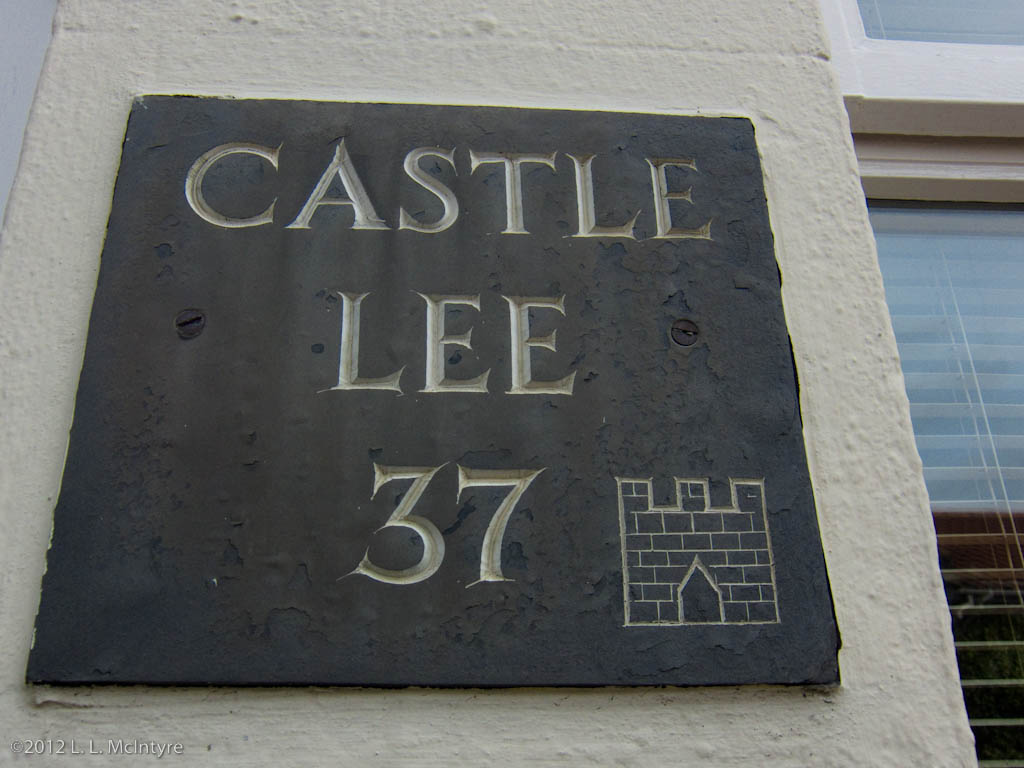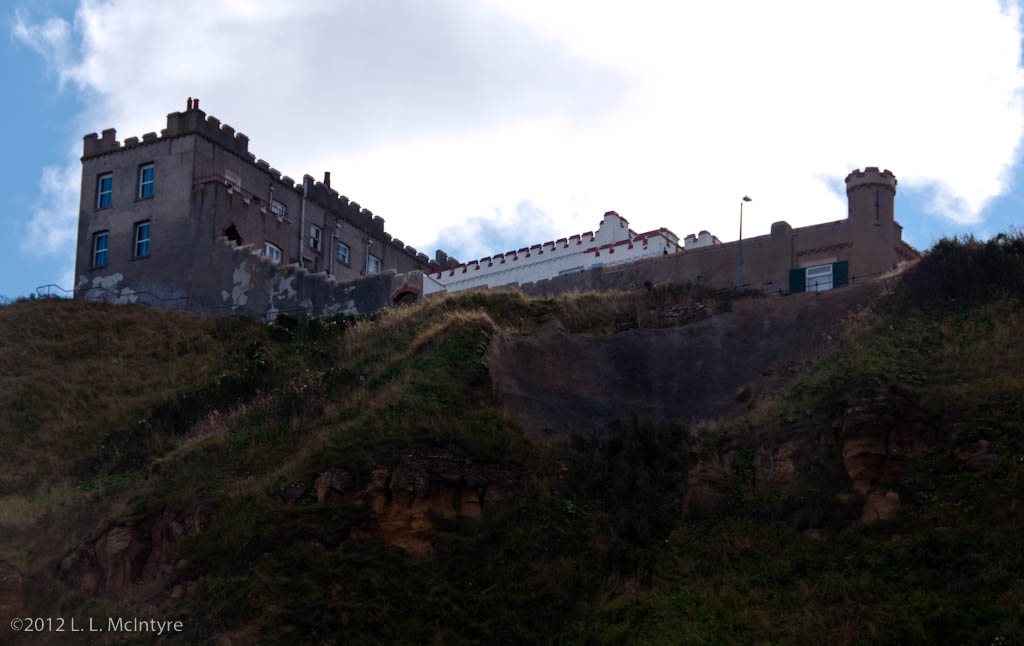Technically we’re still in Scarborough here on the blog again today, but not for the photos. Instead we have a linguistically challenging pudding that Chris and I first encountered there.
But first, let’s start with the fact that names don’t necessarily correspond to what things actually are. For example, the word “castle” can be applied to any number of places that aren’t necessarily castle-looking. Consider the plaque on this wall which gives a name to a house on the South Bay side of Scarborough:
As you can figure out when you spy a portion of the window visible to the right of the plaque, this was a modern-style, not-so-interesting building. Well, not so interesting except for the plaque. And the name – “Castle Lee” has a nice ring to it, don’t you think?
Now, there are ruins of an actual castle in Scarborough, as seen in so many of the photos in yesterday’s post. Just below those ruins, however, is a building that looks like it should be a castle. But it isn’t, even though its name is: the The Castle By the Sea (it’s a Bed and Breakfast guest house).
This building is situated on the hill just below the castle ruins. While it’s really a B&B, they also have a little cafe/tea room that’s open to the public at lunchtime. Chris and I were the first customers the day we went, and they made everything from scratch while we waited, including hard-boiling the eggs for the egg salad sandwich we ordered. For dessert, they offered a selection of house-made “puddings”, pudding being the general term in England for what in the U.S. we would call the dessert.
For my part, I selected a scone. I love scones, and tried them everywhere we go in England. The best one I had on this trip was at this Castle by the Sea – truly delectable.
Chris, on the other hand, selected for his pudding a piece of a cake that had a layer the consistence of the filling in an American pecan pie, a layer of raspberry jam, a white icing, and a cherry on top. The man at the cafe called it something that sounded like “beak-el”.
There was no menu that listed the puddings, so we had no idea how to spell that. But, I figured we could easily look it up on the internet, should I want to blog about it, right?
Well, Chris —who is a master finder-of-all-things on the Internet— tried a variety of spellings: beeckel? beeckle? beakel? beakle? beakal? bickel? No luck. He then brought up a list of traditional English desserts. Looking at the pictures, the closest dessert we could find was a Bakewell Cake, which looked pretty close to what he’d eaten at the Castle by the Sea:

Bakewell Cake (photo from Wikimedia)
Except the picture in the Wikipedia entry (shown above) indicates it’s a single-serving kind of tart, whereas the dessert that Chris had was a piece cut from a larger pie-shaped cake. But, at least this seemed close. We figured what Chris had must have been a specialty of the cook at the Castle by the Sea, or maybe another kind of variation on the true Bakewell Cake. The name was completely different after all: Bakewell isn’t anything like “beakle”, right? I mean, how could you possibly pronounce “Bakewell” as “beak-el”?
Then again … George Bernard Shaw and others over the years have noted that the vagaries of English spelling mean you can’t necessary tell how a word in English is spelled just by hearing it, nor can you tell how a word in English would be pronounced just by seeing how it’s spelled.
Suddenly, I remembered the relationship between the spelling and the British pronunciation of the Southwark area in London. You see, in London, they pronounce “Southwark” as “suhth-ik (phonetic [sʌðərk]), whereas my American English pronunciation of the spelling would come out “south” + “wark” (rhymes with “lark”, but with an initial “w” sound).
Which means my American English pronunciation deviates from the British pronunciation is some significant ways:
- the “w” is not pronounced at all
- the initial vowel sound after the “s” has shifted, moving away from the American vowel sound in that word
- the second vowel sound after the “w” as also shifted, to become a less distinctive “schwa” sound
So, starting with the linguistic principle that phenomena in languages are regular and not random, I realized I could apply some of those same spelling-to-pronunciation correspondences from “Southwark” to figure out how to pronounce the name of that pudding that Chris ate in Scarborough.
And lo and behold, doing that predicts that the British pronunciation of the spelling “Bakewell” would actually be something that sounds like “beeckle.”
Amazing.
And amazing, too, that I applied things I learned in linguistics class when talking about a dessert we had in Scarborough. You just never know when random things will come in handy, eh?
BTW, you’re probably wondering what Chris thought of his Bakewell Cake slice as a dessert.
Dare I say it … he pronounced it “very good. “



Once a linguist, always a linguist, eh wot?
And dare I say, Chris pronounced it very good but you pronounced it very well?
Professor Higgins lives I see.
Ashley, that is a groaner in any language.
Worcester, Ma always gets me tongue tied.
I was told I would need a Scotish-American Dictionary if I wanted to make sence of the Englisl language there. What does linguists say about the variations of dialect. Or should I really ask.
Thanks, everybody!
@Ashley – yes, as my Russian professor in college, who also had a degress in Linguistics once said, sometimes you just can’t help yourself and that linguistic stuff just comes out. As for what you dared to say – cute, cute.
@Mom – indeed, on both counts.
@Kathy – Linguistics do indeed have a lot to say about dialectic variations, but we won’t be going into that here at the moment, unless I discover another name for that cake. 😉